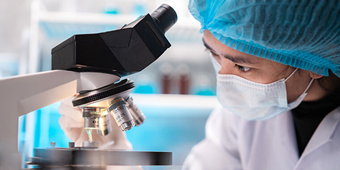One More COVID-19 Effect: Delayed Cancer Screenings

Answer a few questions and we'll provide you with a list of primary care providers that best fit your needs.
Cancer screenings have long been a powerful tool for preventing and detecting many cancers in their earliest stages. But in the midst of the COVID-19 pandemic many preventive health care routines came to an unexpected halt.
As coronavirus infection rates soared in 2020, health care providers across the country had to devote a large portion of their resources to caring for COVID patients. And many individuals, wanting to limit their exposure to the virus, opted to delay important tests such as mammograms, skin checks, and colonoscopies.
Though their caution may have helped slow the virus’ spread, it may have unintentionally led to an increase in many preventable and treatable cancers being diagnosed in later, more advanced stages.
Premier Health Now spoke with surgical oncologist James Ouellette, DO, about the impact of delays in preventive health care and the continued importance of routine cancer screenings.
Good Intentions, Unintended Consequences
“It’s true that we’ve seen an increase in later-stage cancer diagnoses across the board,” says Dr. Ouellette. “This is problematic especially when you consider that certain cancers such as colon, lung, and breast have such better outcomes when they’re caught earlier.”
Cancer rates could be even higher among low-income and elderly patients who might have already had less access to medical care due to costs or lack of transportation before the pandemic.
Thankfully, though, Dr. Ouellette has seen the situation begin to change for the better as more and more people are rescheduling crucial screenings. “Our medical system has adapted very well, as we’ve seen people begin to reemerge since the vaccine’s come available.”
He adds, “I can’t emphasize enough just how important it is to take these routine steps. Ongoing prevention and detection at the earliest stages is so much easier and beneficial to a person’s long-term health. Now is the perfect time to evaluate your own health history along with any potential risks, and schedule screenings accordingly.”
Answer a few questions and we'll provide you with a list of primary care providers that best fit your needs.
Sources: James Ouellette, DO, Premier Surgical Oncology; CNN





